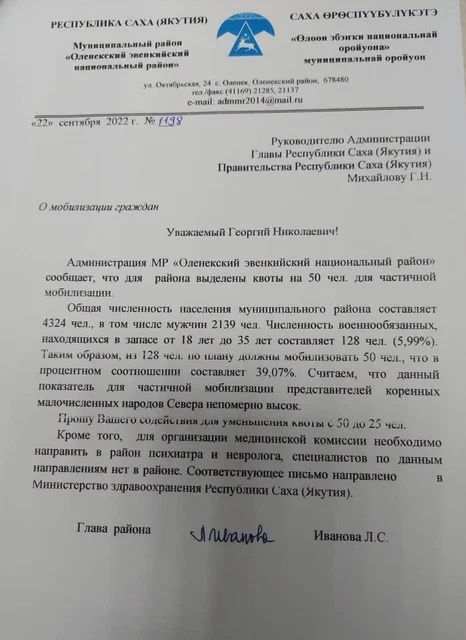On September 21, 2022, the President of the Russian Federation, Vladimir Putin, announced the partial mobilization of the 18-49-year-old male population in Russia to participate in the war with Ukraine. On the same day, an order of the military commissar No. 182, “On the Announcement of Mobilization,” was issued in the Republic of Sakha (Yakutia). Unfortunately, partial mobilization activities in the Republic of Sakha (Yakutia) involve numerous human and Indigenous rights violations and violations of the provisions of federal Russian legislation on deferral and exemption from military service.
For example, as the Russian Ministry of Defense argues, there are no set quotas for mobilization. Instead, each region and ethnic republic have a separate mobilization task, which depends on the number of citizens registered in the military. However, in reality, mobilization is carried out indiscriminately in both large and small rural villages, without regard to the size of the ethnic and male population, and without considering the rights of Indigenous Peoples. Thus, in addition to the people eligible for military service, many people who are not eligible for military service were mobilized in the Republic of Sakha (Yakutia) – those, who did not serve before, students, elders, people with disabilities, and heads of families with many children (Source: Open letter to Putin from the chairman of the Sakha Shamaev Congress). Summonses were handed out late at night (1:00 – 2:00 am) with a minimum time for gathering of their belongings (2-3 hours) and with the threat of imprisonment for five years in case of refusal to mobilize. In the early morning (5:00 – 6:00 am), the mobilized men were taken by bus or planes to the assembly point in the city of Yakutsk, where there were sometimes not enough places for accommodation. There were not enough blankets, linen, or basic shelter. At temperatures below 0°C (less than 32°F), mobilized people from uluses (districts) were forced to spend the night in tents without heating, covered with mattresses.
While the official Russian authorities conceal the real statistics, an analysis of the first days of mobilization in the Russian Federation from September 22 to September 25, 2022, conducted by anti-war activists in the Republic of Sakha (Yakutia), the Republic of Buryatia, the Republic of Tyva, and the Republic of Kalmykia, as well as independent Russian media shows ethnic selectivity and a blatantly disproportionate number mobilized from ethnic regions compared to the central regions and cities of the Russian Federation. Thus, from the small settlements of the Far North, almost the entire able-bodied young male population has been mobilized. In the Olenek Evenki national region, where the total number of people is 4,324 people, and the number of young men aged 18-35 is only 128 people, 50 people are subject to mobilization. This is 39.07% of all young Evenk men in the region. In the Kobyaysky ulus (district), where Evenk Peoples (a small numbered Indigenous Peoples with a population around 22,000 people) live, men have been taken from their reindeer herds by helicopters.

